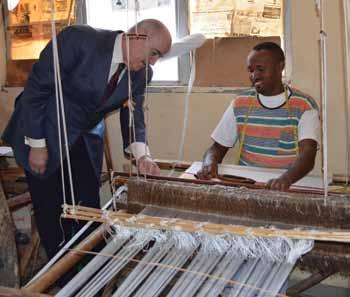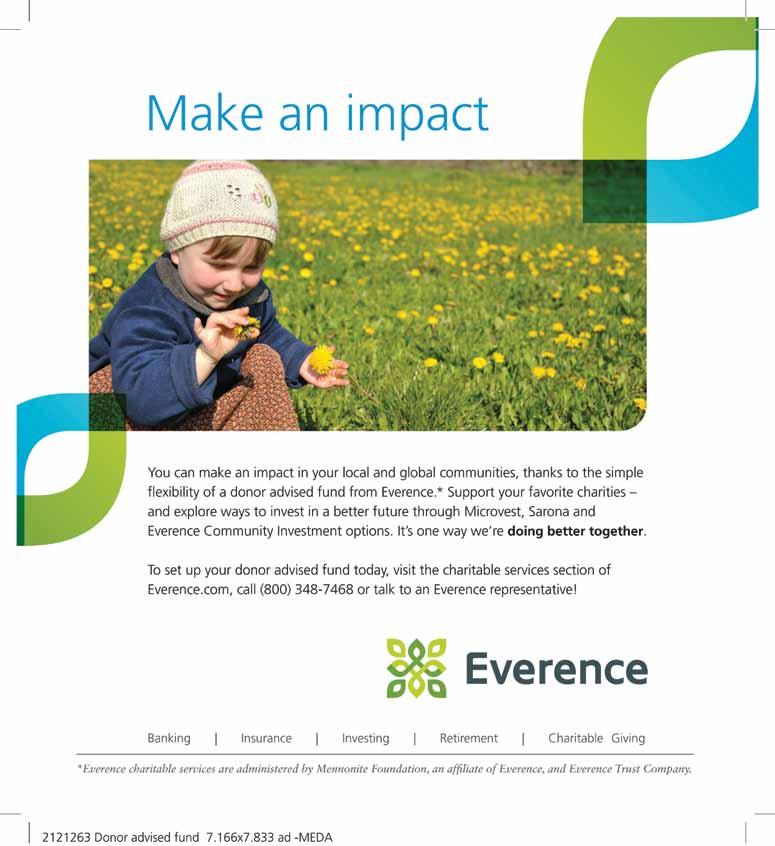
6 minute read
News
Government visitor praises MEDA’s “tangible results”
Julian Fantino, Canada’s Minister for International Cooperation, recently paid a visit to MEDA’s EDGET project (Ethiopians Driving Growth through Entrepreneurship and Trade) and praised MEDA’s sustainable approach to economic development.
Advertisement
The project, which receives funding from the Government of Canada through CIDA, aims to help 10,000 farmers and weavers to create more sustainable livelihoods.
“This is exactly the kind of project that Canada is proud to support as it delivers tangible results, helps lift families out of poverty and puts countries on track to becoming self-sustaining,” Fantino said.
The five-year project is helping textile producers and rice farmers to increase their incomes by helping them reach higher-value markets, learn new production techniques, implement new technologies, and gain access to support services such as finance. Since the project began in 2011, weavers have seen their incomes rise 14 to 18 percent.
Fantino talked with several local weavers and a designer to learn how they became involved in EDGET and the impact it has had on their lives. A male weaver told him, “I have more, steady orders and receive more money for my products because of the linkage to designers. In this group, we work together to encourage quality and delivery of our orders on time.”
A female weaver added, “Since this project and the new things I learned about developing my business and to improve the quality of my weaving, I have gotten more orders and am able to save
CIDA Photo courtesy of ©ACDI
Canadian cabinet minister Julian Fantino chats with a weaver during a visit to MEDA’s project in Ethiopia.
Comments? Would you like to comment on anything in this magazine, or on any other matters relating to business and faith? Send your thoughts to wkroeker@meda.org money. I have made enough money to buy a new house for my family.”
Local designers also benefit from the project. Said one, “It has given me access to more excellent quality weavers for the fabric for my designs. In Ethiopia there is a strong, proud heritage of excellent weaving skills and we are investing and leveraging that expertise by linking these weavers to high-end buyers here and through export markets.” — MEDA release
The young and restless need jobs — or else
Youth unemployment is ratcheting higher on the global doom scale. It is now commonly being called a crisis, and was listed in The World in 2013 (published by The Economist) as one of the biggest problems facing the world.
That is no surprise to economic development practitioners who have long lamented the 25% unemployment rate among young people 15 to 24 in north Africa and the Middle East.
“Clearly, this is a critical business issue,” writes Dominic Barton, managing director of McKinsey & Company. A survey by his company found that 40% of employers from Asia to Africa report having trouble finding skilled workers. “We forecast that by 2020 there will be a global shortfall of 85 million high- and middleskill workers for the labour market,” he writes.
Beyond the needs of employers, however, there is a social and political price to pay.
“If young people who have played by society’s rules — working hard, for example, to graduate from school and university — find fewer and fewer opportunities to secure decent jobs and the sense of respect that comes with them, society will have to be prepared for outbreaks of anger or even violence,” Barton writes, noting recent riots in several regions.
“As the jobless young resentfully note, the gap between the haves and havenots in the OECD countries is at a 30-year high, with income among the top 10% nine times higher than that of the bottom 10%.”
One ingredient of the disconnect is inadequate training (a problem which MEDA’s programs in Morocco and elsewhere seek to remedy). Employers complain that entrylevel workers lack the right skills, yet educators contend those skills are precisely what they have been trying to teach.
“In our survey, nearly 70% of employers blamed inadequate training for the shortfall in skilled workers, yet 70% of education providers believe they suitably prepare graduates for the jobs market,” says Barton. “Similarly, employers complain that less than half of the young whom they hire have adequate problem-solving skills, yet nearly two-thirds of the young believe that they do have such skills.”
One solution to the impasse, he says, is greater cooperation between those who train the young people and the ◆businesses that will hire them.
Too old to keep working, or time for Act Two?
When Pope Benedict decided to call it a career at the age of 85, he sparked a blizzard of commentary on the “second act” of life.
Hordes of people are working beyond what used to be considered retirement age. A new survey by Sun Life finds that only 25 percent of Canadians expect to leave their jobs by the age of 66. In a similar survey five years ago, twice as many respondents said they planned to retire at that age.
Many will keep working because of pension shortfalls, but writers in the financial press are asking: Now that people are living longer, and many of them are healthier, is it time to think differently about work?
“Extended retirement isn’t affordable and it isn’t terribly good for us,” writes Geraldine Bedell in The Guardian. “All the research on healthy longer lives shows that the more engaged and involved we feel, the better we age, physically and mentally.”
While some kinds of work, such as cognitive tasks requiring swift reactions, are best done by the young, don’t be too quick to write off seniors, she writes. When it comes to “making connections, assessing the quality of competing arguments and emotional intelligence — the ingredients of what we commonly call wisdom — people go on improving for a long time.”
People with a business bent may want to take note: “The good news for second actors is that entrepreneurs over the age of 50 have a significantly higher success rate than their younger counterparts,” Bedell writes. She traces this assertion to Marc Freedman, founder of the Purpose prize for social entrepreneurs over the age of 65. In his book, The Big Shift, Freedman contends that after the age of 50 or so people start to appreciate that their lives are not infinite. They sense that the sand is running to the bottom of the glass but they still feel there is enough time left to be useful. Older folk tend to want to leave a legacy that is not merely financial but also social. They also want to focus on the next generation, hence their strong rates of volunteering and helping with childcare.
“The negative view of longevity, then, as a period of inevitable decline and burden on the family and state, is pretty misleading,” Bedell writes. “Of course it is important to focus on dementia, to look for cures and to be concerned about care. But ... it is not the only story about getting old.
“Increased longevity, if we can avoid plagues of modernity such as obesity and death by horsemeat, offers us a huge opportunity to think differently about the life course.... Bring on those second acts.” ◆





